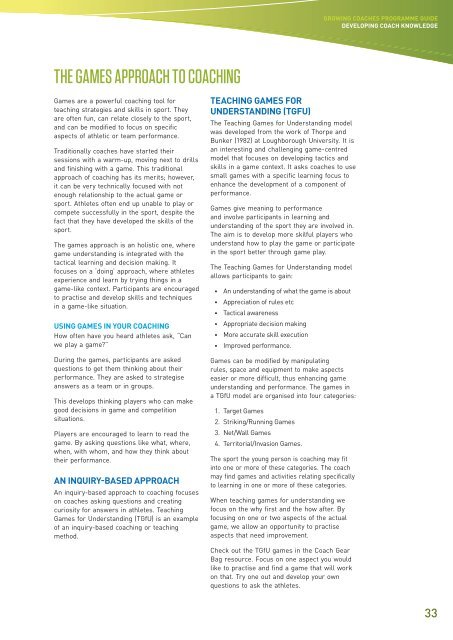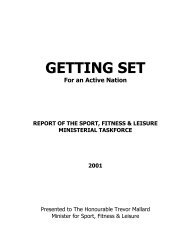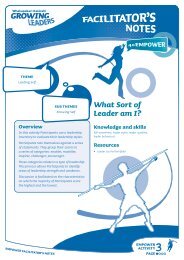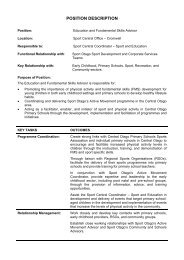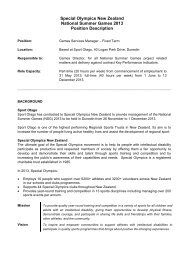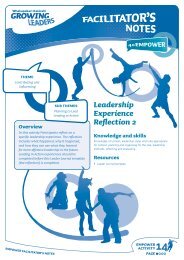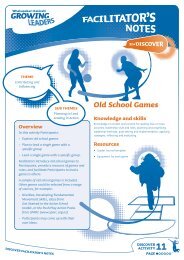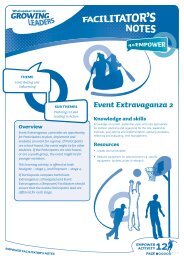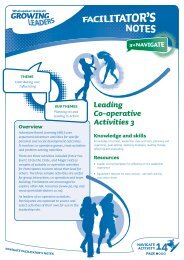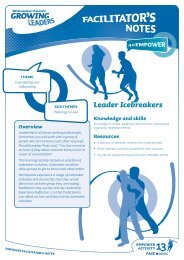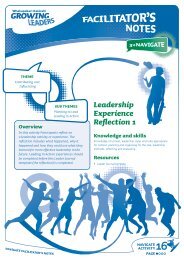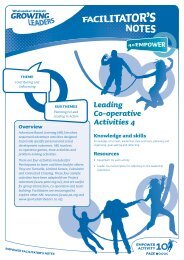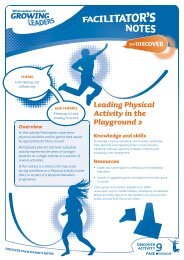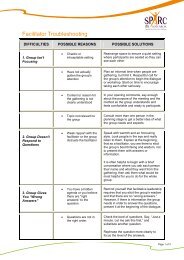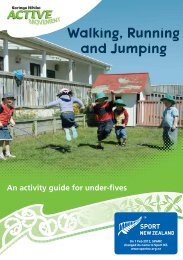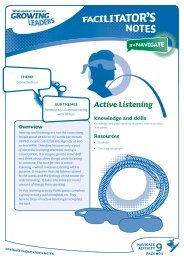Growing Coaches Programme Guide - Sport New Zealand
Growing Coaches Programme Guide - Sport New Zealand
Growing Coaches Programme Guide - Sport New Zealand
You also want an ePaper? Increase the reach of your titles
YUMPU automatically turns print PDFs into web optimized ePapers that Google loves.
GROWING COACHES PROGRAMME GUIDE<br />
DEVELOPING COACH KNOWLEDGE<br />
THE GAMES APPROACH TO COACHING<br />
Games are a powerful coaching tool for<br />
teaching strategies and skills in sport. They<br />
are often fun, can relate closely to the sport,<br />
and can be modified to focus on specific<br />
aspects of athletic or team performance.<br />
Traditionally coaches have started their<br />
sessions with a warm-up, moving next to drills<br />
and finishing with a game. This traditional<br />
approach of coaching has its merits; however,<br />
it can be very technically focused with not<br />
enough relationship to the actual game or<br />
sport. Athletes often end up unable to play or<br />
compete successfully in the sport, despite the<br />
fact that they have developed the skills of the<br />
sport.<br />
The games approach is an holistic one, where<br />
game understanding is integrated with the<br />
tactical learning and decision making. It<br />
focuses on a ‘doing’ approach, where athletes<br />
experience and learn by trying things in a<br />
game-like context. Participants are encouraged<br />
to practise and develop skills and techniques<br />
in a game-like situation.<br />
USING GAMES IN YOUR COACHING<br />
How often have you heard athletes ask, “Can<br />
we play a game?”<br />
During the games, participants are asked<br />
questions to get them thinking about their<br />
performance. They are asked to strategise<br />
answers as a team or in groups.<br />
This develops thinking players who can make<br />
good decisions in game and competition<br />
situations.<br />
Players are encouraged to learn to read the<br />
game. By asking questions like what, where,<br />
when, with whom, and how they think about<br />
their performance.<br />
AN INQUIRY-BASED APPROACH<br />
An inquiry-based approach to coaching focuses<br />
on coaches asking questions and creating<br />
curiosity for answers in athletes. Teaching<br />
Games for Understanding (TGfU) is an example<br />
of an inquiry-based coaching or teaching<br />
method.<br />
TEACHING GAMES FOR<br />
UNDERSTANDING (TGFU)<br />
The Teaching Games for Understanding model<br />
was developed from the work of Thorpe and<br />
Bunker (1982) at Loughborough University. It is<br />
an interesting and challenging game-centred<br />
model that focuses on developing tactics and<br />
skills in a game context. It asks coaches to use<br />
small games with a specific learning focus to<br />
enhance the development of a component of<br />
performance.<br />
Games give meaning to performance<br />
and involve participants in learning and<br />
understanding of the sport they are involved in.<br />
The aim is to develop more skilful players who<br />
understand how to play the game or participate<br />
in the sport better through game play.<br />
The Teaching Games for Understanding model<br />
allows participants to gain:<br />
. An understanding of what the game is about<br />
. Appreciation of rules etc<br />
. Tactical awareness<br />
. Appropriate decision making<br />
. More accurate skill execution<br />
. Improved performance.<br />
Games can be modified by manipulating<br />
rules, space and equipment to make aspects<br />
easier or more difficult, thus enhancing game<br />
understanding and performance. The games in<br />
a TGfU model are organised into four categories:<br />
1. Target Games<br />
2. Striking/Running Games<br />
3. Net/Wall Games<br />
4. Territorial/Invasion Games.<br />
The sport the young person is coaching may fit<br />
into one or more of these categories. The coach<br />
may find games and activities relating specifically<br />
to learning in one or more of these categories.<br />
When teaching games for understanding we<br />
focus on the why first and the how after. By<br />
focusing on one or two aspects of the actual<br />
game, we allow an opportunity to practise<br />
aspects that need improvement.<br />
Check out the TGfU games in the Coach Gear<br />
Bag resource. Focus on one aspect you would<br />
like to practise and find a game that will work<br />
on that. Try one out and develop your own<br />
questions to ask the athletes.<br />
33


